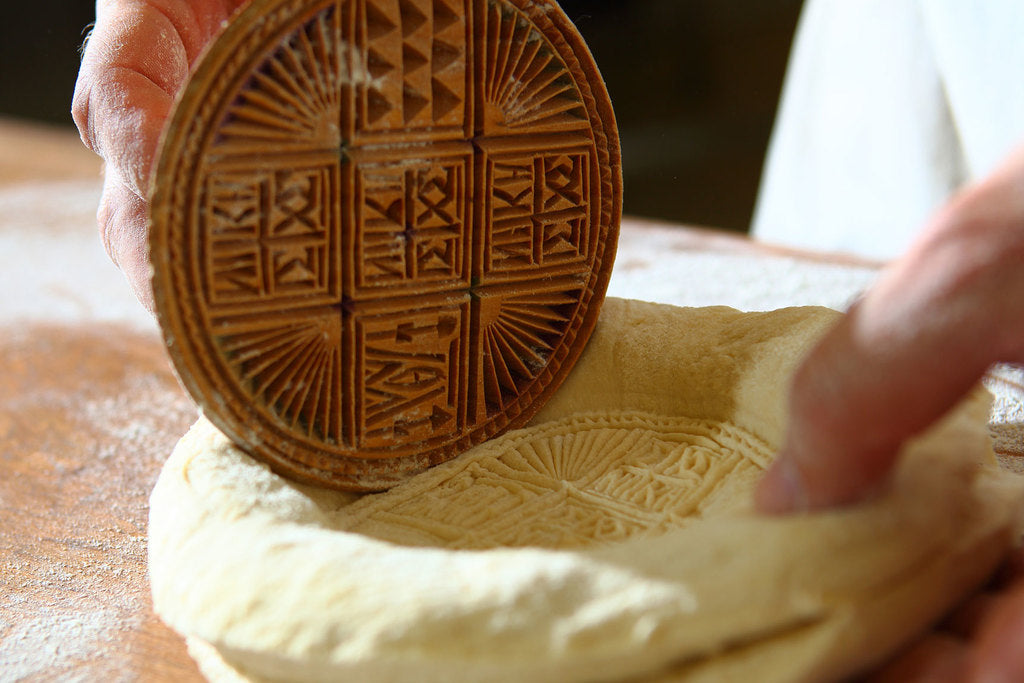
In the Orthodox Church, the Holy Eucharist or Holy Communion is considered the “Sacrament of Sacraments”. The Holy Eucharist (thanksgiving) is the main event and highest form of Orthodox worship and the culmination of the service of the Divine Liturgy.
For the celebration of the Divine Liturgy, the faithful offer to God the bread which is called Prosphora (from the offering) and the wine. These products look meaningless, but they are the fruits of man's labors and symbolize our lives, which we offer to The God, as a gift of thanksgiving.
To better understand this, let's think about how bread and wine are made. For the first one we mix flour, water, salt and "dough" (yeast or sourdough). Yeast causes "fermentation", a chemical process that makes the dough inflate. The second is prepared in a similar way. The occurs with the grape which is converted with the alcoholic fermentation into wine.
These two products have always been common elements of a man's diet. When we consume the bread and the wine, they are absorbed by the organs of the body and they are transformed into blood and flesh. It's common knowledge that without food we cannot survive. For this, bread and wine are used as symbols of our offering (Prosphora) to The God. By offering these two elements to God, it symbolizes the offering of our lives to Him. The rite is not a mere presentation of gifts, but rather also includes a certain offertory/sacrificial meaning.
In the Divine Liturgy these two simple elements, with the presence and the grace of the Holy Spirit, they are transformed into the Body and the Blood of our Lord Jesus Christ( Holy Communion). When we commune, we receive within ourselves the very Jesus Christ, the Heavenly Food, which shall give us the Eternal Life.
The Prosphora Seal has a round shape and in the center there is a circular seal with the shape of The Cross. In its center there is a square that reads "ΙΣ ΧΣ NIKA" which translates to Jesus Christ Conquers.
In the preparation for the Holy Gifts, the priest is dicing the Prosphora bread in small pieces called "Amnos" (sheep). He places it on the Holy Disk and only this part of the Prosphora bread will transform with the Grace of the Holy Spirit into the Body of Christ in the Holy Liturgy.
In the center is the Lamb (symbol: IC XC NI KA Christogram), to the viewer's right is the Panagia, mother Mary (symbol: ΜΘ (Μήτηρ Θεοῦ)), to the left are the Nine Angelic Ranks (symbol: nine triangles), and on the top and bottom are extra Lambs for Presanctified (symbol: said Christogram). Both these parts are cut and separated by the priest from the Prosphora bread, according to the Oblation (Προσκομιδή), and are being placed in a corresponding way on the Holy Disk. The rest of the Prosphora bread are cut into several smaller pieces and distributed as Communion Wafers(Αντίδωρο) to the members of the congregation at the end of the Holy Liturgy. With this offering to The Feast in the Holy Liturgy, we actually participate in its preparation as worthy members and we contribute with the fruits of our labor transform to Jesus Christ Himself.
The priest uses a series of special objects to prepare our offered gifts, such as the Paten, the Chalice and the Asterisc, and the preparation service is called the Proskomide.
According to the tradition the Prosphora bread is being kneaded in at home, separately from other types of bread and is being treated with special care and prayer during the process. The result of our personal effort is becoming our expression of love before God Himself. In order to offer our gifts to God and these being accepted by Him, certain conditions must be met. God is asking for true repentance and a pure heart filled with love and kindness even to our enemies.
According to Matthew 5:23-24:
«Ὅταν προσφέρεις τὸ δῶρο σου στὸ Ναό, κι ἐκεῖ θυμηθεῖς ὅτι ὁ ἀδελφός σου ἔχει κάτι ἐναντίον σου, γύρισε ἀμέσως πίσω. Πήγαινε πρῶτα νὰ συμφιλιωθεῖς μὲ τὸν ἀδελφό σου καὶ ὕστερα ἔλα νὰ προσφέρεις τὸ δῶρο σου»
Which translates to
"Therefore, if you are offering your gift at the altar and there remember that your brother or sister has something against you, leave your gift there in front of the altar. First go and be reconciled to them; then come and offer your gift."
